I spoke earlier today at Tools of Change in Frankfurt. The short version is that many of the things we think about ebooks are wrong: but they are very interesting. The future of the book lies in its aura not in its copies, and that’s why I’m launching Open Bookmarks. For the longer version, read on… (As ever, far more was said on stage than these notes, but there you go).

4 things: introductions and what I do; the form of the ebook; bookmarks etc.; and an announcement.
Regular readers will know my history. CompSci / AI degree, into publishing to avoid it, but then gradually made the two things, literature and tech, come together. Luckily I was preceded by Douglas Rushkoff who’d made the case for programming or being programmed – or as I tend to put it, mixing your own paint.
I introduced a number of projects: Bookkake (Print-on-demand is a non-web technology, which nevertheless reconstitutes existing infrastructure through the lens of the network), The Golden Notebook (reading is social; we communicate through annotations), Enhanced Editions (ebooks need to do new things, inhabit new perceptual modes), the Twitter book (we’re confused by changes in our understanding of time, ephemerality and media), Artists’ eBooks (mixing up content creators and new technologies, while still focusing on literature), the SXSW Fieldnotes (wrangling temporal formats) and of course Wikihistoriography (enough said).
When I first started talking about eBooks six, seven years ago, the general attitude of the publishing industry was: No. And this has, thankfully, changed, but it’s interesting to revisit and investigate those reasons, and the reasons they were wrong, and perhaps think about what’s still wrong.

The above image typifies the arguments back then, and still to some extent now: people don’t like reading off a screen, people like the shape and size of books, you can’t read ebooks in the bath, they don’t smell right. All these are refutable and have actually been refuted: people read off screens all the time, people are discovering ereaders in huge numbers, you can’t drop a book in the bath either, really, you’re just less upset when you do. You can read ebooks better in bed, because they can be backlit. I’m not going to get into the smell thing. That usually ends in shouting.
The problem here is that these are all arguments about the physical book: about its physicality. And while traditional books are physical objects, that’s not the core of our relationship with them. The truth is that books are essentially not physical objects, but temporal ones.
This is what one aspect of the life of a book looks like: advert, through the reading experience, and out the other side as a souvenir. Just one possible timeline, but a powerful one. The ebook as it stands only caters (poorly) to that bit in the middle, which unfortunately is also a black hole in publishers’ understanding, an area we’ve always been strangely incurious about.
So the real problem with the ebook as it stands is that it denies us many of these temporal aspects, which produces a kind of cognitive dissonance. And there’s a social layer that forms around this, another timeline of reading reviews and discussing with friends, that the ebook could actually exploit better than the physical book, if we work on it some more. We really need to look at how we address this temporal mode with ebooks.
Like appropriation. How do you write your name in an ebook? How do you have that same sense of ownership as you do with a traditional book. We spend a lot of time with these individual texts – per-unit consumption time, books are real companions. We go on journeys with them. It’s important to maintain that connection.
This process should be more visible. It’s visible in paper books when we crack the spine and dogear chapters and fray and tear the pages and scribble in the margin. This is real metadata, this is where our experience of the book lives.
Souvenirs too. How do we create souvenirs of ebooks. This is actually a problem for all digital media, because I’m not sure there’s such a thing as a digital souvenir. By their very nature souvenirs are discrete, tangible. They don’t exist on screens. Books, as I’ve said, are souvenirs of themselves. (Like the bookcubes – a rubbish but potentially interesting version of this. This blogpost stands in / expands on this section.)
My favourite example: one of my favourite novels by my favourite author. Expensive, because it’s a First edition, but even more expensive because it’s an inscribed First:
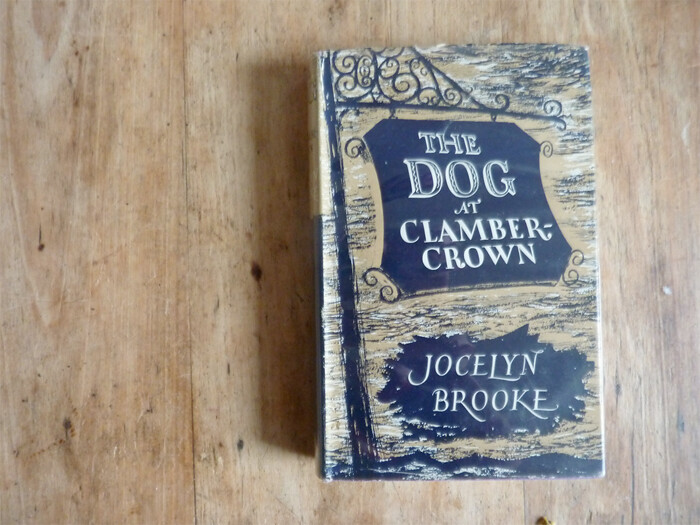
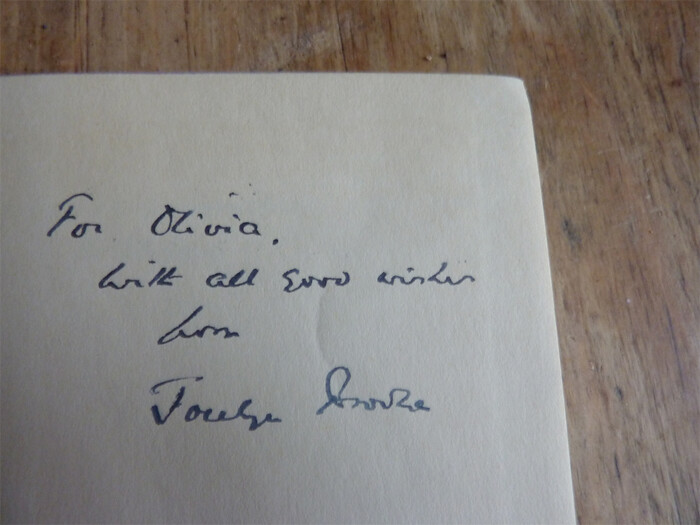
Brooke signed it to his friend, the reviewer and critic Olivia Manning. Her library recently came up for sale and I got this one. This is a book with its history inscribed in it, a really wonderful thing. And we can’t really do this with ebooks, just as they can’t be souvenirs of themselves, as wonderful as that is too. So what can we do, to enable this temporal mode, to make the ebook as special as the physical book?
Well, the thing I’ve been thinking about a lot, the thing I keep coming back to, is Bookmarks. Bookmarks in all their forms: as underlining, dogears, annotations, notes and references. User-generated tags and footnotes. A horrible phrase, but. There is something there.

The way people bookmark is fascinating. Some people think it’s the worst thing you can do, second to actually burning the thing. Other people, like me, do it a lot, but rarely return to the page. I’m trying to break myself out of that by blogging all dog-eared pages. Some people have really advanced strategies, like using the top of the page as a pointer and the bottom corner for interesting things. Some people even tear the page. Those people are definitely evil. (You can read more about dog-earing and so on in this blog post – I also took a brief discursion into Book Guilt and talked about marginalia and commonplace books.)
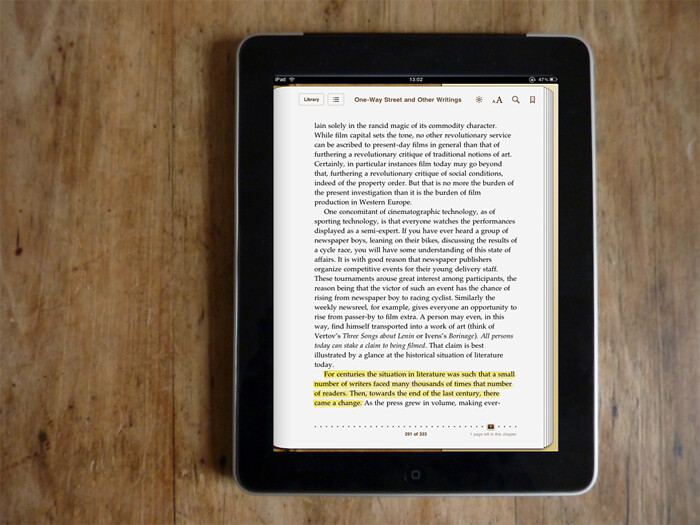
What’s interesting is that I’ve found myself doing this more and more and more as I read more electronically, first on my old Nokia, and then the iPhone, and now on the iPad. The facility of electronic bookmarking that doesn’t deface the text. Here it is in iBooks. One swipe, bam. Everyone is going to be bookmarking and annotating more.
That bit’s from Walter Benjamin: “For centuries the situation in literature was such that a small number of writers faced many thousands of times that number of readers. Then, towards the end of the last century, there came a change.” He’s talking about the end of the nineteenth century of course; can you imagine what he would have said about the internet? I miss Benjamin. It seems wonderfully appropriate to be talking about him in Frankfurt, and I’ll talk about him a bit more in a minute…
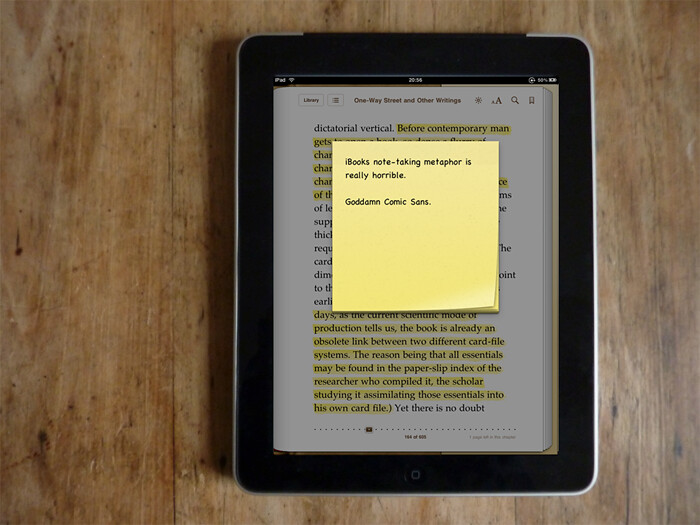
iBooks also lets you take notes – marginalia. These are horrible, but it’s a start. And then there’s the Kindle. Not only can you highlight and make notes like you can on the iPad, but they’ve put in the the tiniest little nod to socialising the reading experience…

That. That’s it. I mean, it’s nice, but it’s useless. It tells you precisely nothing, because anyone can go through a book and pick out the 10 or 20 averagely most high-information-content sentences, and sure enough, these will be the ones everyone picks. The quotes everyone picks are not interesting. The quotes a few people – critics, teachers, friends, even the author themselves – pick out: those are interesting.
This is pretty amazing though. This is real future stuff, appropriate, as I’m reading William Gibson. I’ve been reading it on my phone, so when I next pick up my iPad, it asks if I want to skip to where I got to on my phone. Brilliant. Yes. Thank you. Magic.
This is the edges of something amazing. But there’s a massive problem with these examples, which is that they’re closed. iBooks is really bad. You can’t send your bookmarks anywhere, you can’t even copy them easily. And the Kindle sends your bookmarks to the web, but they stay entirely within the Amazon system. And that’s not how we read and it’s not how we want to read and it’s not how we should read.
We hear a lot in the publishing industry about the music industry, and how we don’t want to go that way. But perhaps we do, in some ways. Because this is what the music industry looks like to me now:

This extraordinary, interconnected ecosystem of vendors and aggregators and discovery engines and list-keepers and cloud streamers and APIs and analysers and social-ish networks and so on and so forth. It’s very powerful and it’s very open (and no, it doesn’t include any labels and that is scary).
Bkkeepr was an early attempt to create something that sat in this kind of ecosystem. And it sort of worked and sort of didn’t and it limps bravely on, but there are more things coming along in this space, interesting things.
Like OpenMargin (currently in closed beta, thanks to Joep for the pics):
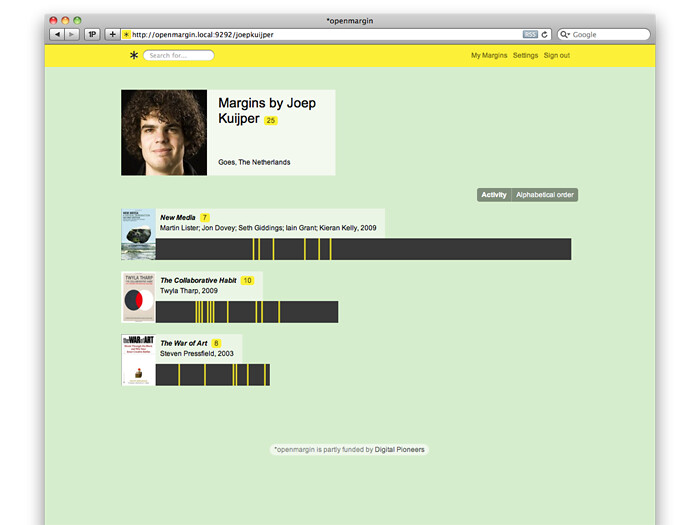
Or Everyread (likewise, but trust me, it’s lovely).
And these guys should not have to build their own ereader to be able to aggregate reading data. Because your bookmarks, your reading experience should – must – belong to you and not to Apple or Amazon or whoever. This information should be open and available so we can create these ecosystems.
Now comes the theory bit. We need a better definition of what we’re talking about here: a way to talk about this conversation and activity and socialisation of the book, and it struck me that we were given a pretty good term for this 80 years ago, in Walter Benjamin’s “The Work of Art in the Age of Mechanical Reproduction”.
That term is aura.

Benjamin writes about the aura of a work, and how that aura is diminished by the process of copying, because the highest quality of art is its place in the here and now. But I think that, 80 years on, we are building the tools to reclaim that aura and make it more valuable again. Business models, even social models, get broken all the time, and they get broken before we figure out how to replace them. Likewise, the aura model of art got broken 80 years ago, but we just might be figuring out how to fix it. What kills industries now is the same storm out of paradise that broke businesses before – but might just fix them in the future.
Here’s what Benjamin says about the book’s aura, about its unique existence: the aura resides in the changes a work has undergone in its physical structure and it includes the fluctuating conditions of ownership through which it may have passed.

And here he is again: the genuineness of a thing is the quintessence of everything about it since its creation that can be handed down, from its material duration to the historical witness that it bears. Sound familiar? Isn’t that what we’ve just been talking about? About appropriation and annotation and material history? Doesn’t that, properly understood, make this less scary:

That’s David Shields, in Reality Hunger. He’s a bit fundamentalist, but he’s got a point (he might, possibly, be quoting William Gibson here, but I can’t find the original). The long-form text is not dead, but the physical book is, and the digital copy does not have value in the same way.
So, what do we do about this? How do we reactivate the book’s temporal life, its aura, to create something we feel as passionate about as the physical book? Because we need to hold onto it, and we need something we can share and pass on.
I believe that the copy is no longer important, that we can all get the book, the text itself, if we need it. What is valuable and what is core and what we can lend to our friends and pass onto our children is not copies of books but originals of our own experiences, associated with those singular works of art.
Which is where Open Bookmarks comes in.

Open Bookmarks is not a thing, it’s a proposal, a flag in the ground. We need to agree on a way of sharing and storing annotations and bookmarks, reading attention data and everything around the book: that aura.
Open Bookmarks will provide a venue for agreeing on a format for doing that, and will then push for its wider adoption.
Lots of lovely people have already said they want to be involved, from social sites like Everyread, Bookglutton and OpenMargin, ereaders like Ibis, Enhanced Editions and Kobo, aggregators and data sources like the OpenLibrary, and individuals and organisations with form and experience in this area.
If you’d like to be involved, please sign up at Open Bookmarks, and we’ll get this thing moving. Thanks.
Thanks for this great service, James – now I can throw away my notes(or keep them as a physical souvenir).
And thanks for today’s great live experience, of course.
Comment by Herr F. — October 5, 2010 @ 1:45 pm
Brilliant. You are so right. Have just signed up.
Comment by James Spackman — October 5, 2010 @ 1:50 pm
Looking at your example of the online music ecosystem with it’s tangle of apis and open datasets. Have you taken a look at how people behave around TV online too?
The wikis annotating episodes in obsessive details and the tweeting reactions to live broadcasts seem close to behaviours around book reading, although readers are less likely to be reading in sync than with TV.
There’s conveniently an event around the topic in Conway Hall soon: http://2-screen.com/
Comment by Dan W — October 5, 2010 @ 2:03 pm
[…] Today, over my bowl of generic Cap ‘n Crunch, I had my first vision of the ebook future, in which there might be actual interaction between readers. It’s called Open Bookmarks. It’s the brainchild of James Bridle over at booktwo. Open Bookmarks is still in development, but it promises to be the solution to sharing annotations. James explains it better than I can so go read the summary of his talk from the Frankfurt Tools of Change conference. […]
Pingback by Libromancy » Open Bookmarks! — October 5, 2010 @ 2:56 pm
Amazing. We’re working on an almost-identical project to one you mention above.
Also, to take the argument a step further: Beyond annotations, think of things, physical objects put/left inside books.
Comment by Hakan Ensari — October 5, 2010 @ 3:11 pm
Very excited to see this project starting James! Thanks for initiating something very beautiful.
Comment by Emil Ovemar — October 5, 2010 @ 10:21 pm
Fully onboard and very much up for seeing this become a massive success. This is a great idea.
Comment by Michael Bhaskar — October 5, 2010 @ 11:26 pm
[…] in another room, where he was giving his own talk (one I’d have loved to see) clever old James Bridle only went and announced a rather cool new project, Open Booksmarks. I wish him, and the project, luck, it’s […]
Pingback by Frankfurt Day One 2010: TOC Frankfurt, Canada Livres International Rights Seminar | Eoin Purcell's Blog — October 6, 2010 @ 12:34 am
[…] Walter Benjamin’s Aura: Open Bookmarks and the future eBook | booktwo.org […]
Pingback by Korta klipp – 06 October 2010 — October 6, 2010 @ 7:03 am
[…] fantastic booktwo post explains it in detail, but his note sums up the […]
Pingback by Dog ears, auras, and digital souvenirs… — Speakeasy — October 6, 2010 @ 7:26 am
Recently IDEO produced concept video about the future of the book. It is interesting watching, but I think the notes and annotation sharing is naive.
http://www.youtube.com/watch?v=ISxgVmRnFq8
The “debate” about the book, where people can share notes and inline comments, I worry will slide into noise. People with extreme positions don’t want to listen to others and/or only listen to opinions they already agree with. Saying 355 people highlighted this area does mean that it is contentious or interesting, but once you start to display everyone’s annotations, you need to remove the spam, remove the noise, then it is a short step to remove people you disagree with. I really don’t want passages in my book to become “youtube comments” full of misspellings and hate. You could limit annotations to just friends, but then you are back to groupthink. Those sort of discussions are probably better face to face.
So while everyone is touting the “socialness” and evolution of the book, I wonder if that is the wrong focus – or too much focus. A “social” article, is a blog post with comments, and that has moved onto other mediums. I like the idea of bookmarks across mediums, devices and friends, but i am hesitant of any more of these social features given the track record elsewhere.
Comment by Brian suda — October 6, 2010 @ 12:09 pm
Thanks all for the interesting and supportive comments. Please do keep sending links to other variants.
Dan W – Aware of but missing 2Screens unfortunately. Parallels evident…
Brian S – Yes, I’ve seen the IDEO video… have avoided talking too much about it too much, but it’s a lot of recapitulated ideas that have been floating around for a while, nothing new, just better branded.
I agree with what you say about socialising the book – in part. We need to build the tools to allow “selfish socialising”, i.e. open, portable data for individuals, that they can open up to friends if they wish.
—-
Also, following some interesting chats in Frankfurt, want to pre-empt any comments on the political nature of the breakdown of the aura, its status as a Marxist, democratising principle. This requires more thought, and I know it.
Comment by James Bridle — October 6, 2010 @ 12:16 pm
Great idea, and we’ll forgive you the AI past ;-)
I wonder how rich it should be, similar things like, say, TV Anytime seemed too rich, but it would be wonderful to bookmark at an abstract layer (e.g. not tied to particular editions) or at a very specific layer (e.g. to bookmark the birthday greeting scrawled inside the cover).
Comment by dumbledad — October 6, 2010 @ 3:57 pm
[…] The Internet makes opportunities to work with this network of intertextuality. See, for example, James Bridle’s OpenBookmarks project, launched just this […]
Pingback by Book Industry in Crisis? | pub401 — October 6, 2010 @ 7:21 pm
What a lovely post. There’s also academic marginalia that could be added – what famous writers wrote in their books, whether their own work or that of others. That would add an extra layer to the hierarchy of annotations.
I was also wondering, could something like Open Bookmarks work with actual libraries? As in real-life ones, that are rapidly losing their relevance? Something like this, that demonstrates how the value of the book isn’t in the copy but the ownership (however temporary), could really revitalise their service.
Comment by Kat Sommers — October 7, 2010 @ 3:54 pm
This article is brilliant. I would have used this information regarding so many important things about the process and uses of the ebook three days ago when an exam I had to present had only one question and it was “What is a book in the XXI century?”
Aura, that would have been my main argument.
Damn you, Benjamin
Comment by Miss P — October 9, 2010 @ 4:12 am
If you haven’t read the Flann O’Brien / Myles na Gopaleen columns on “book handlers”, do. They’re in The Best of Myles. It’s satire, but it’s also a great reflection on the wear and tear of a well-loved library.
Comment by nick s — October 9, 2010 @ 10:07 pm
@ Nick S – Oh, I have, but thanks for the reminder…
Comment by James Bridle — October 11, 2010 @ 3:14 pm
A very exciting proposal, James. I was thinking along similar lines while working as an educational designer a few years back. I hadn’t thought of the Walter Benjamin connection, though ironically I was reading Benjamin back then too.
No, my reference point was the Jewish Talmud, in which the primary text, the Mishnah, is literally surrounding by multiple generations of scholarship in the margins. If you’ve never seen a page of Talmud, have a look at this http://bit.ly/8hMnJv (Later eras of scholarship have smaller Hebrew text)
I wonder if Benjamin had this in mind (if I remember rightly, he was having a lot of conversations with Gerschom Scholem at the time).
Comment by Justin Tauber — October 15, 2010 @ 1:01 am
We are very interested in this proposal at Widescript. Looking forward.
Comment by Francisco Treacy — October 16, 2010 @ 4:39 pm